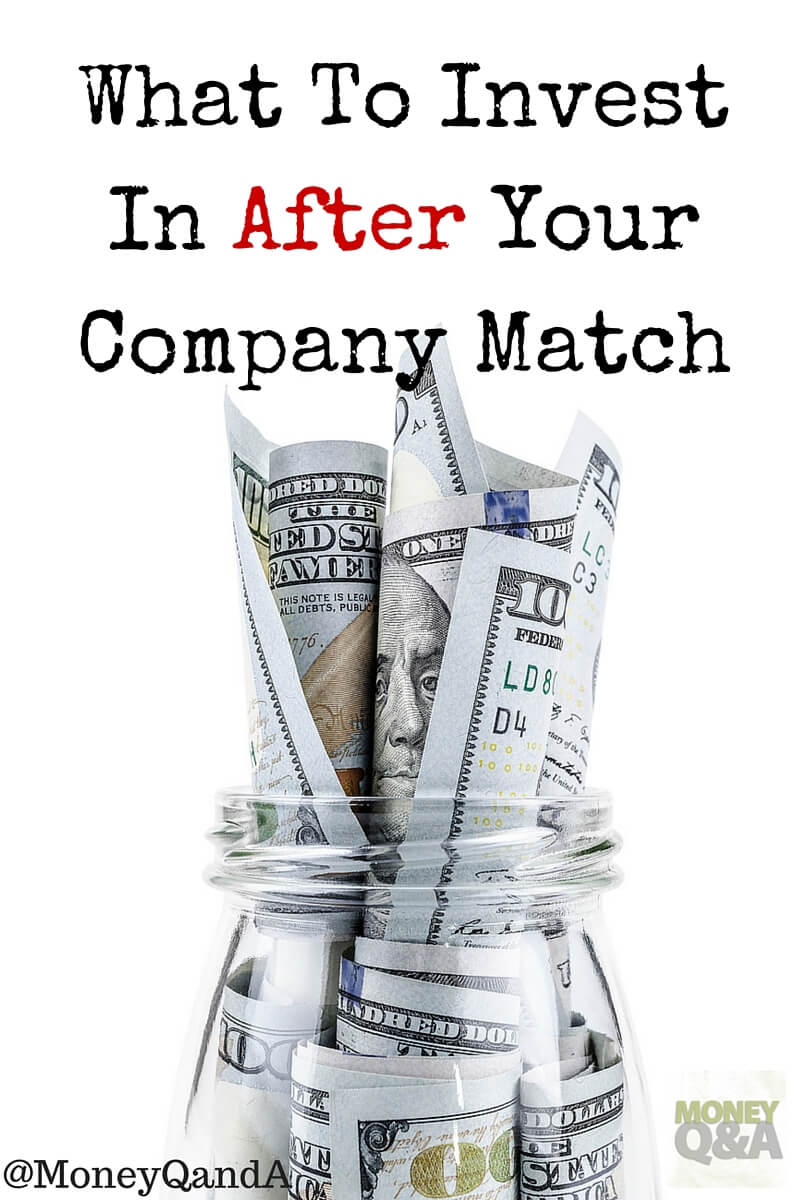
If you’re not familiar with Dave Ramsey’s book, you should run right out and get it. It is one of my top ten best personal finance books that everyone should read. Now….on to our reader’s question. I recently received an email from a reader, Ralph, who ask…
I’ve been investing more than my company’s match. So for instance if my401k company match is 5% and I invest 10%, is it better to continue or just invest the 5% that’ll get the match and invest the rest in a Roth IRA?
This is a great question that a lot of investors have to tackle when they are deciding where to put those finite investing dollars to work. You often can’t be everywhere at once.
So, the real question is where to start and where to go after you get going with your retirement investing. There are several things that you should consider in order to maximize your savings and minimize your tax liability as well.
401k Company Match Is Most Important
It is very important to invest enough money in your employer’s 401k retirement plan in order to capture your company’s matching contribution. This is essentially free money and a 100% rate of return on your investment.
Like Ralph mentioned in his email quoted above, he earns a401k company match on the first 5% of his income that he contribution to his 401k retirement plan. After putting in 5%, Ralph’s company gives him another 5% free, hence the 100% rate of return.
This is the typical agreement that many employers have with their workers who contribute to their 401k retirement plan. Offering the401k company match matching contribution is cheaper in the long run for the company that offering a traditional pension which is why it has become a very popular option.
But, now what should you do with additional investments over the 5%? Continuing to invest in your company’s 401k retirement plan after your initial 5% may not be the best idea.
Taxes Rule The Decision
Do you think that taxes will rise from now until the time you retire? Delaying the time that you pay your taxes into the future may not be the best idea if you are going to be in a higher tax bracket later in life when you withdrawal the money and owe taxes on it.
If you think that taxes will rise over your career and qualify to invest in a Roth IRA, you will most likely save more money in taxes investing money in a Roth instead of a 401k retirement plan. A 401k requires investors to contribute pre-tax dollars initially and then pay taxes on the total amount withdrawn in retirement.
Roth IRA contributions are invested initially with after-tax dollars from your paycheck that have already been taxed, and then your earnings and interest on your contributions can then be withdrawn tax-free in retirement.
The Final Word: Where To Invest
I personally think that income taxes will tend to rise over the long-term. Most young workers are typically in a low income tax bracket early in their careers, and the goal of everyone is to continue to earn more money throughout your careers in order to get into a higher tax bracket after earning more.
So, I typically recommend that people should always invest enough to capture their employer’s 401k company match. After that, if you qualify to contribute to a Roth IRA, then that should immediately be your next stop for an investment.
After you have captured your employer’s401k company match and matching contribution and maxed out your Roth IRA to the tune of $5,000, then you should consider investing more in your 401k. Until then, consider including your Roth IRA as fast as possible.
Past Readers’ Questions:
- How To Prioritize Which Bills To Pay First
- Should You Put Your Emergency Fund In Mutual Funds?
- How Do You Start Saving If You Live Paycheck To Paycheck?
- How To Find A Payment Plan Without Cutting Necessities
- Is My Money Save In A Bank?
- Is It Better To Save For Closing Costs Or Pay Down Loan?
- Is A $1,000 Emergency Fund Enough To Start?
- What To Invest In After The 401k Company Match
Do you have a money question that you would like to ask? Email me your money, investing, retirement, savings, or other question to Questions[at]MoneyQandA.com. If I pick your question for next week’s article in the series, I’ll send you a free copy of Dave Ramsey’s book, The Total Money Makeover, or you can pick from any of these other free books instead.


Good post Hank. A couple of things to also consider are whether a person’s 401(k) plan offers a Roth option and the time value of money. With the former, the Roth 401(k) option allows a greater contribution than a Roth IRA, if someone is able to contribute more than the $5,000. As for the latter, while it might make sense for younger workers to contribute to a Roth IRA in lieu of additional 401(k) contributions as you suggest, this is not a no-brainer by any means. While tax rates may move higher in the future, one has to take a stab at looking at the value of current tax deduction vs. a tax-free withdrawal at some point in the future. This can get complex and many assumptions need to be made. My point is that banking on some unknown future benefit is not as compelling as it might seem at first blush.
Thanks for adding those reminders, Roger. You definitely make some great points. I appreciate you adding them. There are definitely other options than simply the 401k and Roth IRA.
Also, income limits and tax predictions (lacking predictions, diversification). If the income qualifies, I like to think:
1) 401(k) to match
2) Roth IRA
3) Traditional or Roth 401(k)
(Wild cards: debt & emergency fund. Probably put those number 2 if they are needed!). That way you’re diversified tax-wise, you got the full match, and you saved a bunch for retirement. What do you think?
That is a great list of where I think that most people’s retirement investing priorities should be. Company match, Roth IRA, and then back to the 401k.
Although you may make more money as you progress in your career, once you retire your income will probably decrease dramatically. This is because you will just be taking out your living expenses as income.
Brent,
You make a good point. There are a lot of variables that go in the calculations obviously. While you can end up with a smaller taxable income in retirement, a great number of investors will likely go from a low income tax bracket into a larger one in retirement especially if they worker longer, start investing early, and income taxes rise in the future.
I currently put 6% in to my company Roth 401K to get the full match. My income exceeds the IRA limits for tax incentives. Should I increase my Roth 401k contributions, contribute additional funds towards the traditional 401K or invest on my own in a non-retirement account.
If you think that your taxes will rise over your career and you qualify to invest in a Roth 401k, you may save more in taxes by investing money in the Roth 401k. Continuing with the Roth 401k even after the match may be a good option.
An important consideration in my view: the integrity and ethics of the investments in each plan. My wife has a nice company 401(k) but the stock investments include tobacco, guns, nuclear power, and defense contractors. With an IRA, a person can pick clean investments that don’t play on guilt and regret or that violate a person’s conscience or religion. I’ve heard arguments that we should complain to the company investors, but they don’t seem to have individual considerations as priorities — just monetary profit.